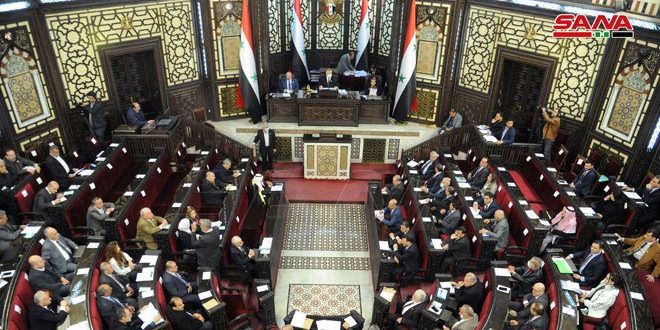Sabbagh: Continuing the fruitful cooperation between the People’s Assembly and the government/ Arnous: We seek to raise the standard of living for citizens
On January 16th, the People’s Assembly held the first session of its 5thordinary round for the 3rd legislative term, chaired by its Speaker Hammoudeh Sabbagh with the attendance of Prime Minister, Eng. Hussein Arnous and the ministers.
In a speech at the beginning of the session, Sabbagh stressed the need to continue the fruitful cooperation between the People’s Assembly and the government, each within the framework of its competencies and tasks, and to continue exerting more efforts and constructive work in order to achieve the best at all levels according to the directives of President Bashar al-Assad.
Sabbagh pointed out that today’s session is devoted to a general discussion with the Prime Minister and the ministers on the work of the Cabinet, its programs and policies.
Sabbagh expressed hope that the plans set with the aim of achieving the requirements and aspirations of the loyal Syrian Arab people will be implemented.
Engineer Arnous affirmed that the Syrian state has taken upon itself the responsibility of rebuilding the entire national geography that has been restored and seeking to integrate it into the normal economic and social life cycle so that it will be a source of wealth and it will fulfill its national role.
Engineer Arnous pointed out that the second half of the current year will witness an improvement in the field of electrical services through increasing generating capacities and providing more quantities of fuel and gas to so generating more power capacity.
“We seek to raise the standard of living condition and improve the purchasing power of citizens through improving the economic and service production cycle in the country,” Engineer Arnous said.
On the issue of internal transport, the Prime Minister stated that this year will be better as a contract has been made with Iran to supply 500 buses and through a grant provided by the friendly Chinese side, which will buy an estimated at 100 buses, in addition to direct contracting to purchase 100 buses and maintenance and repairing of a number of other buses that were damaged by terrorism.
Engineer Arnous pointed out that the Economic Committee approved the renewal of the mass transit fleet of the Syrian Company for Transport and Tourism by purchasing dozens of buses that will run on the main transport hubs between the governorates.
Engineer Arnous pointed out that subsidies constitutes an important component of the economic and social policy of the Syrian state, and under the guidance of President Bashar al-Assad, Syria is committed to subsidies as an economic and social intervention tool aimed at enabling needy families to access resources that help them improve their standard of living.
Engineer Arnous clarified that subsidies mechanisms are not necessarily permanent and valid, especially in light of the negative aspects that accompany the application of some of them, which are clearly manifested in the resources going to those who do not deserve it.
Engineer Arnous stressed that the government is following up the subsidies file in a planned and systematic manner aimed at redirecting the subsidies capabilities and resources allocated to it to the target families and the neediest.
Inas Abdulkareem/ O. al-Mohammad

